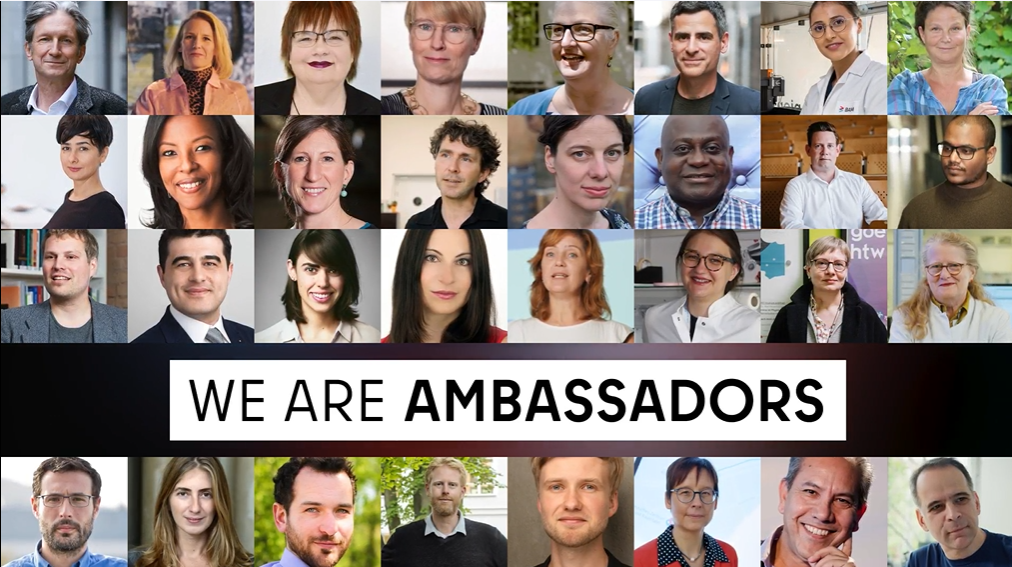Excellent opportunities for young talents
Berlin's scientific community not only trains highly qualified talent but also ranks among the city's largest employers.
Approximately 20,000 individuals are employed in university-based research and teaching (excluding administrative and technical staff). Around 200,400 students benefit from the excellent educational institutions within Berlin’s academic landscape (as of March 2025).
Each year, more than 33,000 graduates from over 1,000 different degree programs successfully complete their studies at Berlin’s universities. Twenty percent of the student population comes from abroad.

Diverse pathways into science
Our Brain City ambassadors are the best example: Science in Berlin is diverse and exciting. It offers room for personal development and access to high-level contacts.
Berlin is a global metropolis. In the field of science, there are renowned experts for every topic. Thanks to the high concentration of young people in their 'Sturm und Drang' phase, Berlin has always been a breeding ground for change: a special place for new ideas and unconventional paths.
More than 26,000 people in Berlin are employed in research and development and work at university and non-university research institutions and companies. Just under 200,000 students currently take advantage of Berlin's outstanding educational opportunities in the sciences (as of May, 2023).
Each year, more than 33,000 students graduate with degrees in more than a thousand programs. 20% of the students come from abroad.
After completing my doctorate, I was certain that I didn’t want to remain within the academic system. This was mainly due to the intrinsic structural issues of an academic career. My advice would be that there are alternative paths into science beyond the traditional route of a postdoc and junior professorship. Stay open-minded and follow your heart!
Studying in Berlin – at universities, universities of applied sciences or private universities
Studying for a degree can be done full-time, part-time, while completing an apprenticeship or even though you're already fully employed. The opportunities for prospective students in Berlin are wide-ranging and each offers different advantages. The selection of universities in Berlin is also very extensive:
Universities
Berlin is home to three of the world’s most renowned universities as well as the largest art school in Europe. In addition, there is Charité – Universitätsmedizin Berlin, which includes a medical faculty and a university hospital. Since 2019, these four institutions have been funded as the Berlin University Alliance (BUA) under the Excellence Strategy competition of the German federal and state governments.
The overarching goal of the BUA is to create a shared, integrated research space and to further develop Berlin as a leading location for science.
- Freie Universität Berlin (FU Berlin)
- Humboldt-Universität zu Berlin (HU Berlin)
- Technische Universität Berlin (TU Berlin)
- Universität der Künste Berlin (UdK Berlin)
- As well as Charité – Universitätsmedizin Berlin mit einer medizinischen Fakultät und einem Universitätsklinikum.
Further information about the Berlin universities
Universities of applied sciences
More than a quarter of all students are enrolled at one of the seven universities of applied sciences in Berlin. They offer research focuses ranging from robotics at the Berliner Hochschule für Technik (BHT) to economics at the Berlin School of Economics and Law (HWR Berlin), whereby the links between science and business are always in the center of interest.
- Berliner Hochschule für Technik (BHT Berlin)
- Hochschule für Technik und Wirtschaft Berlin (HTW Berlin)
- Hochschule für Wirtschaft und Recht Berlin (HWR Berlin)
- Alice-Salomon-Hochschule Berlin (ASH)
- Evangelische Hochschule Berlin (EHB)
- Katholische Hochschulle für Sozialswesen Berlin (KHSB)
- Hochschule des Bundes für öffentliche Verwaltung (HS Bund)
Further information on Berlin's universities of applied sciences
Private universities
A total of 23 state-recognized private universities offer students a predominantly internationally oriented education. Among them are Brain City Berlin partners: Arden University Berlin, Berlin School of Business Innovation (BSBI), Business & Law School (BSP), ESCP Business School Berlin, GISMA University of Applied Sciences, SRH University, University of Europe for Applied Sciences (UE), and VICTORIA International University.
Further information on Berlin's private universities
Other post-secondary schools
More than 5,000 budding artists are enrolled at the city's four art academies. They shape the Berlin art scene and have make the capital a true center for art and creativity in Europe.
- Universität der Künste Berlin (UdK Berlin)
- Hochschule für Musik Hanns Eisler Berlin (HfM)
- Hochschule für Schauspielkunst Ernst Busch Berlin (HfS)
- Weißensee Kunsthochschule Berlin (KHB)
Use programmes such as STARTUP TEENS or the EXIST start-up grant to secure support or initial equity-free financing. Quickly produce a ‘Minimum Viable Product’ (MVP) as a basic version of your product to test it. And, above all: Don’t be afraid to share your idea – the more you talk to people about it, the more valuable feedback you will get
Ideal conditions for scientific start-ups
Berlin is Germany’s start-up capital. Around 500 start-ups enter the market here every year, including many innovative scientific spin-offs operating in future-oriented fields such as DeepTech, BioTech, or NewSpace - some with groundbreaking products and solutions. A key reason for this is the high level of inter- and intradisciplinary research conducted at universities, colleges, and non-university research institutions across Brain City Berlin.
Through start-up programs and specialized incubators, knowledge and technology transfer between science and industry is actively initiated and supported.

Further information on dual studies in Berlin:
- Science & Startups - Excellent Startup Services: a network of start-up centers within the Berlin University Alliance (Freie Universität Berlin, Humboldt-Universität zu Berlin, Technische Universität Berlin, and Charité - Universitätsmedizin Berlin). The ranking Europe’s Leading Start-up Hubs listed Science & Startups among the Top 20 in 2025.
- Startup Incubator Berlin: Sart-up center of the Berlin School of Economics and Law.
- HTW Startup: Start-up center of the Berlin University of Applied Sciences for Engineering and Economics.
- BHT Startup Hub: With its Lean Incubator Program, the Berlin University of Applied Sciences supports first-time founder teams and early-stage start-ups.
- Chemical Invention Factory (John Warner Center for Start-ups in Green Chemistry“, CIF): The incubator specializing in Green Chemistry is scheduled to open in 2026 on the campus of TU Berlin in Charlottenburg. The CIF will provide chemistry start-ups with offices, laboratories, and analytical equipment.
- Leap Quantum Technology Hub: The coworking space opened in 2023 in Berlin-Adlershof focuses on quantum technologies (QT). Leap connects innovative minds from the start-up scene with researchers from Berlin’s QT sector.
- Bayer Co.Lab Berlin: At the end of 2024, Bayer launched its new life science incubator. Co.Lab Berlin is part of Bayer’s global network of life science incubators located in key innovation hubs such as Cambridge (USA), Kobe (Japan), and Shanghai (China).
- K.I.E.Z. - Künstliche Intelligenz Entrepreneurship Zentrum: These initiatives by Science & Startups promote and support young entrepreneurs in the field of artificial intelligence providing scientific expertise as well as access to capital, industry partners, and talent.
- Food Campus Berlin: The innovation campus for the future of nutrition is being developed in Berlin-Tempelhof. The focus areas include: smart proteins, personalized nutrition, circular economy, and robotics/AI.
- BerlinBioCube: The start-up center opened in 2023 offers life science companies a total of 8,000 square meters across five floors, providing space for modern laboratories, offices, and communal areas. It is located on the campus of Berlin-Buch, which specializes in life sciences.
- Zukunftsorte Berlin: Berlin’s 11 “Zukunftsorte” are vibrant ecosystems where science and business intersect - with a strong capacity for innovation. Each Zukunftsort has its own thematic focus. Numerous start-ups are based in incubators and co-working spaces at these locations, benefiting from their close proximity to research and industry. The “mother” of all Zukunftsorte is the Adlershof Science and Technology Park.
The diversity of Berlin offers a lot of scientific potential: Practical and committed people come together here and develop and try out new things.
Umbrella organisations of Berlin universities:
- Dahlem Research School (Freie Universität Berlin)
- Humboldt Graduate School (Humboldt-Universität zu Berlin)
- Center for Junior Scholars, CJS (Technische Universität Berlin)
The city's graduate schools, funded as part of the Excellence Initiative, also contribute to the training of young researchers. They are strengthening the internationalization of Berlin as a center for science and play a key role in providing Berlin's top research institutions with the next generation of talent. Graduate schools in Berlin include: